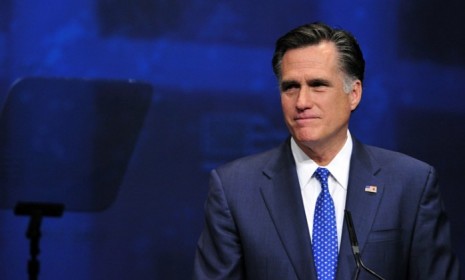7 curious political comparisons: Mitt Romney is just like...
Nobody can remember a presidential primary fight quite like this one. But people are sure trying

A free daily email with the biggest news stories of the day – and the best features from TheWeek.com
You are now subscribed
Your newsletter sign-up was successful
In some ways, there has never been a more topsy-turvy, unpredictable Republican presidential nomination fight than this year's grudge match between Mitt Romney and his surging and crashing rivals. But that's not stopping pundits and armchair historians from offering a parade of analogies to past candidates and campaigns. Sometimes the comparisons work, and sometimes they strain credulity. Here, seven past presidential candidates that bear at least some passing similarity to Romney 2012:
1. John Kerry
The similarities between Romney and the 2004 Democratic presidential nominee are almost eerie, says Anjeanette Damon in the Las Vegas Sun. "Here are the easy ones": Kerry's a U.S. senator from Massachusetts, Romney was its governor; each comes from wealth and privilege and attended Harvard; both are "lacking in interpersonal skills and are awkward campaigners"; and of course, both are derided as serial "flip-floppers," and have "perpetually camera-ready hair." More to the point, just like Kerry in 2004, Romney is seen by his party as "a good fit for the political atmosphere," with the right résumé to take on a vulnerable incumbent hated by his base.
The Week
Escape your echo chamber. Get the facts behind the news, plus analysis from multiple perspectives.

Sign up for The Week's Free Newsletters
From our morning news briefing to a weekly Good News Newsletter, get the best of The Week delivered directly to your inbox.
From our morning news briefing to a weekly Good News Newsletter, get the best of The Week delivered directly to your inbox.
2. George H.W. Bush
The former president and Romney are so similar that the comparisons dominated a recent episode of MSNBC's Morning Joe, says Michael Shear in The New York Times. Bush and Romney are both malaprop-prone, wealthy Republicans whose family ties helped them get ahead in politics, but who later "struggled to earn the trust of the conservatives" in the Republican Party. And Romney's "disconnect with working-class voters is eerily familiar" to anyone who remembers Bush's campaigns: For Romney, the out-of-touch gaffes include casual $10,000 bets and palling around with NASCAR team owners. For Bush, the famous episode was his reported "amazement over a grocery store scanner in 1992."
3. Bob Dole
Some conservative commentators are publicly fretting that after this long, punishing primary, "Romney's public image is now defined by a word never associated with winning presidential campaigns — weakness," say John F. Harris and Jonathan Martin at Politico. The fear is that "once a politician takes on an aroma of hopelessness, he keeps it," like the GOP's 1996 nominee. Senate Majority Leader Bob Dole "limped to his nomination with few people expecting he would make a real race of it against Clinton, and he never did." And neither Dole nor Romney appear to have the "creativity and keen intuition under pressure" needed to turn the narrative around.
A free daily email with the biggest news stories of the day – and the best features from TheWeek.com
4. Bill Clinton
Romney's political "poison doesn't have to be permanent" — just ask Bill Clinton, says Steve Kornacki at Salon. At this point in 1992, Clinton was more unpopular than Romney is now; like Romney, he became the "frontrunner after the party's entire A-list roster passed on the race," and both candidates have faced "limited voter enthusiasm and loud calls for a white knight candidate." And when it comes to foreign policy, says Noah Millman at The American Conservative, candidate Clinton and Romney both opted for "hawkish posturing" and "shameless positioning" rather than serious ideas. If elected, Romney would probably govern like Clinton, too: "A lot of gratuitously alienating bombast around a policy aimed at short-term political considerations."
5. John McCain
"Romney might govern like Clinton, but he's campaigning like McCain," says Daniel Larison at The American Conservative. Whether or not Romney has given foreign policy "a second's serious thought... for some weird reason he can't stop" attacking Obama's foreign policy chops, coming off a lot like McCain. But McCain's foreign policy experience didn't win him the nomination — moderate voters did, says Craig Gilbert in the Milwaukee Journal Sentinel. Both McCain and Romney "used their big margins among moderates to overcome their much squishier support among bedrock conservatives," and both benefitted mightily from flamed-out moderate rivals and "the fragmenting of the conservative vote."
6. Michael Dukakis
The Democrats' 1988 nomination fight was "a brutal multi-candidate primary cycle that ground both the eventual nominee and the general public image of the Democratic Party to hamburger," says Dracowyrm at Daily Kos. And the man who emerged from that mess, Massachusetts Gov. Dukakis, was "the last, least disagreeable choice from a lousy menu." Sound familiar? Dukakis turned out to be "the most hapless and futile Democratic presidential nominee since 1956," a wooden, pandering, hollow politician. I suspect that like Dukakis and his party, "Romney will be an embarrassing memory for Republicans after he is trounced by President Obama in November."
7. Walter Mondale
Romney runs the risk of turning into the next Mondale, says Joe Trippi at Fox News. In 1984, Mondale was the inevitable Democratic nominee... until the voting started. Then he faced a strong challenge from the anointed not-Mondale, Sen. Gary Hart. So Mondale pandered to every part of his party's coalition, says David Frum at The Daily Beast, and by the time he won the nomination, he'd "turned himself into a cartoon of everything that seemed obsolete about... the Democratic Party." Romney risks the same problem, as he's being "successfully pushed to satisfy Republican constituencies and orthodoxies in ways that will only hurt him as a general election candidate."